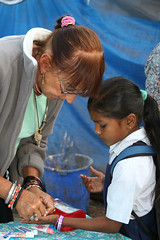This post is now obsolete. I get so many career questions, I have moved it all over to the International Development Careers List and my paid consulting.
American culture is such that I don’t even really like writing this post. But I am starting to get deluged with requests for assistance, and I just don’t have the time to answer them. I have a mortgage to pay and a family to feed – however much I’d like to, I can’t devote my whole life to pro bono work.
This, therefore, is my semi-definitive guide to what I will do as part of my commitment to service, and what falls into consulting work and thus requires pay. Please note that unpaid work depends on me having the time to do it, and therefore may take longer or be refused.
Career Coaching
Service
• Answering any question general enough I can also post it to my blog
• One phone call on any topic
• Any number of emails that are easy for me to answer from my own experience
• Taking a look at a resume and indentifying obvious flaws
Consulting
• Detailed resume review and commentary
• Resume editing
• Advice about what employers are good to work for and what aren’t (because I will not do this in writing, I can’t blog about it)
• Practice interviews
• More than one phone call
Social Media Advising
Service
• Social media audit, including quick recommendations for what could be improved
• Scan of organizational blog and suggestions for improvement
• Guest posting to your blog
Consulting
• Social media audit, with detailed analysis of strengths and weaknesses
• Design of social media plan
• Blog planning, writing, editing, or management
• Social media training
Technical Assistance on Health and Development
Service
• Read proposal and provide general impression
• Suggest resources for learning more about a topic
• Any question I can answer on Twitter
• Helping individual moms with breastfeeding
Consulting
• Technical input into proposal design or evaluation
• Proposal writing or editing
• Training of any kind (except as previously mentioned)
Other random things I think of as service
• Board membership (though I am very picky about what boards I join)
• Speeches
• Providing references
In a nutshell – if you need specific, detailed guidance that takes time to produce, that is paid work. So would anything that requires me to be quoted on the record and/or shift from informal to formal, any communication which requires multiple phone calls, and questions that require research for me to answer or that I find boring.
***************
(photo credit: Sokwanele – Zimbabwe)
Chosen because writing about this makes me kind of uncomfortable, and somehow featuring Zimbawean currency made me feel better.




